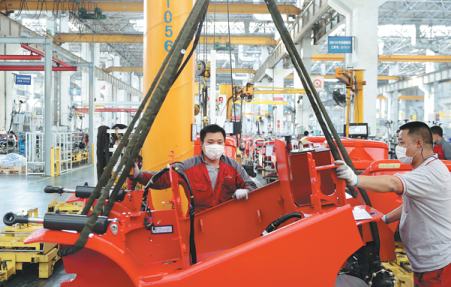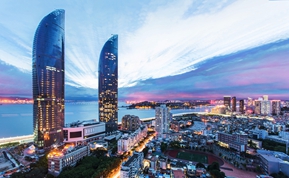From open countryside to modern industrial hub
With constant efforts in cross-island development, Xiamen of East China's Fujian province has seen its districts developed from open countryside to industrial clusters.
In 1980, Xiamen was one of the earliest special economic zones established in China. The city began its economic zone development in Huli district.
Chen Shantong, who worked on the project in the early days, said at that time the local government had focused its efforts on building factories in Huli district.
People believed that the construction of an SEZ should be done at speed with high quality, Chen said.
With such a construction plan, Xiamen has seen rapid development as an SEZ.
In 2010, Xiamen's SEZ area had expanded from the main island to its four districts off the island parts.
According to the city's latest urban plan, its mainland districts have become new hubs for industries including aviation, education and high technology.
"Through cross-island development, the city has expanded its functions and relieved its population stress to its off-island part," said Chen Yong, deputy head of Xiamen Natural Resources and Planning Bureau.
"Xiamen is transforming from an island city to a port city... and is seeing bigger room for development,"Chen said.
The development of transportation has changed the way people work and live in the city.
Zhang Zehua, a manager from a technology company in Xiamen, said he was motivated to move his startup business to the city's mainland five years ago.
He made the decision on the back of the local government's plan to expand the city's transport network as well as other key infrastructure projects.
Expanding Xiamen's development from its main island to the mainland demonstrated the local government's resolve to develop the whole city as an economic zone, Zhang said.
"The enlarged city layout of Xiamen and its increasing influence at home and abroad benefit us a lot," he added.
The cross-island development has helped the city attract more companies from across the world.
Swiss industrial conglomerate ABB Group put its manufacturing base into operation last year in the Torch Industrial Park in Xiang'an district.
In 1992, ABB was the first Fortune 500 company to register a subsidiary in Xiamen. It has since expanded to eight subsidiaries in the city and set up an electrical research and development center in Xiang'an district.
Zhao Yongzhan, senior vice-president of ABB China, said the company's industrial center in Xiamen serves the Chinese market and more than 60 countries and regions worldwide.
"We are a beneficiary of Xiamen's cross-island development," Zhao said.
Official data show that Xiamen has built eight industrial chains, including semiconductors and integrated circuits, computer and communication equipment and flat panel displays, with a total output value of 100 billion yuan ($15 billion).
The city is constructing another four such industrial chains. This will include high-tech companies each with annual revenue of more than 20 million yuan. These companies are expected to account for more than 70 percent of the total industrial output value in Xiamen, according to local officials.

Staff members work on the production line of Linde (China) Forklift Truck in Xiamen. CHEN LIJIE/FOR CHINA DAILY
Why Xiamen
-

Xiamen is one of the most economically competitive cities in China and was one of the first Special Economic Zones on the Chinese mainland. As a vice-provincial city independently listed on the State development plan, it has provincial-level authority in economic administration and local legislative power. In 2010, the Xiamen SEZ was expanded to cover the entire municipality. Today, Xiamen is a modern and international port city.
